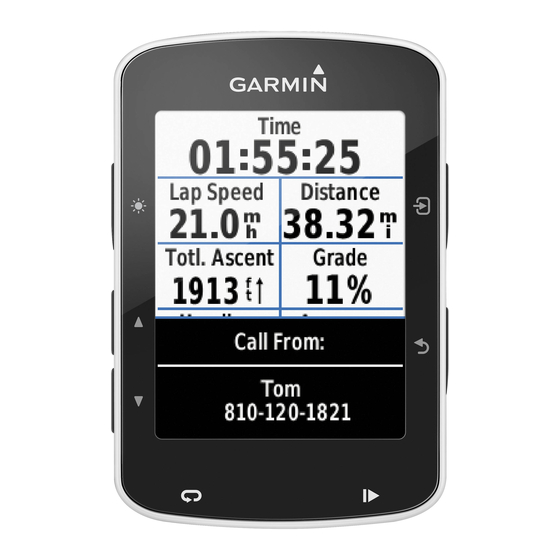Garmin GPSMAP 521/521s Manuel d'instructions d'installation - Page 4
Parcourez en ligne ou téléchargez le pdf Manuel d'instructions d'installation pour {nom_de_la_catégorie} Garmin GPSMAP 521/521s. Garmin GPSMAP 521/521s 12 pages. Flush mount template
Également pour Garmin GPSMAP 521/521s : Manuel de référence (2 pages), Référence technique (42 pages), Informations importantes en matière de sécurité (48 pages), Manuel d'instructions (28 pages), Modèle (2 pages)

To mount the transducer on a transom:
1. Position the transducer mount at the selected transom location. Make sure the transducer is parallel with the water line. Mark the center
locations of each hole on the transducer mount.
Apply marine sealant to all screw
threads to prevent water from
seeping into the transom.
2. Drill
/
in. (4 mm) pilot holes approximately 1 in. (25 mm) deep at the marked locations. To avoid drilling the holes too deep, wrap a piece of
5
32
tape around the bit at 1 in. (25 mm) from the point of the bit.
3. Apply marine sealant to the 5 × 30 mm screws (B). Attach the transducer assembly to the transom using the 5 × 30 mm screws. Adjust the
transducer assembly to extend beyond the bottom of the transom approximately
aluminum hulls. Adjust the transducer assembly to be aligned parallel with the bottom.
4. Tighten the 10-32 locking nut until it touches the mounting bracket, and then tighten
5. Place the first cable clamp (F) on the transducer cable, approximately one third of the distance between the transducer and the top of the
transom.
6. Mark the location. Drill a
1
7. Attach the cable clamp using one of the 4 × 12 mm screws (D). Coat the screw with marine sealant before installation. Repeat steps 5 and 6
using the other cable clamp.
8. Route the transducer cable to the GPSMAP 400/500 series chartplotter.
NotIce: Avoid routing the cable close to electrical wires or other sources of electrical interference.
9. Test the transducer installation after you complete the GPSMAP 400/500 series chartplotter installation. See page 9.
Mounting a Transducer on a Trolling Motor
1. With the ridges of the band facing up, slide the large cable tie through the slot on the transducer mount until equal lengths extend on both
sides of the mount.
NotIce: For cold water and heavy timber or debris areas, a metal 4-5 in. (100-125 mm) worm gear clamp is recommended instead of the plastic
cable tie.
2. Position the mount gasket on the curved top of the transducer mount.
3. With the front of the transducer pointed away from the trolling motor propeller, place the transducer
assembly against the motor body of the trolling motor.
4. Wrap the two ends of the cable tie around the motor body. Place the pointed end of the cable tie through
the fastener hole on the opposite end and pull it through until it is snug but not tight. (The cable tie clicks
when you pull it.)
5. Position the transducer so that it is parallel with the bottom when in use, making sure the gasket is
aligned properly. Pull the cable tie end until tight. Trim off the excess if necessary. Tighten the locking nut
until it touches the mounting bracket, and then tighten
4
The transducer should
extend
/
in. (. mm)
1
8
below a fiberglass hull or
/
in. (9.5 mm) below an
3
8
aluminum hull.
Mount the transducer parallel
with the bottom.
/
in. (3.2 mm) pilot hole approximately
8
Ensure that the transducer is
below water level when the boat
is on plane at high speed.
Do not mount the transducer directly in the path of the
propeller. The transducer can cause cavitation that may
degrade the boat performance and damage the propeller.
/
in. (3.2 mm) on fiberglass hulls or
1
8
/
in. (9.5 mm) deep.
3
8
/
turn more. (Do not overtighten.)
1
4
Mount the transducer
cable cover far above
the waterline.
/
turn more. (Do not overtighten.)
1
4
Front of the transducer
Front of the transducer
GPSMAP 400/500 Series Installation Instructions
/
in. (9.5 mm) on
3
8
Cable tie
Cable tie
